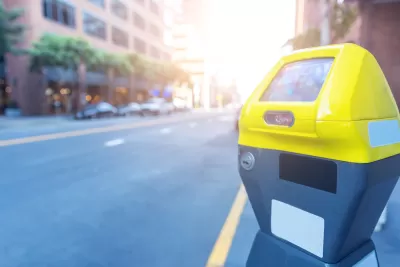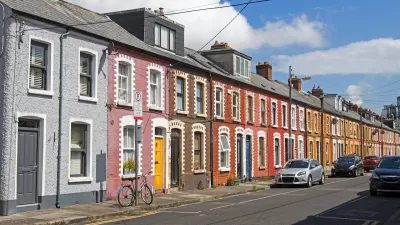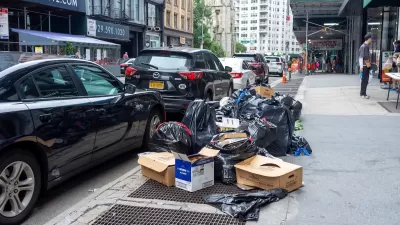Largely used for free car parking, urban curb space is becoming a more precious commodity.

An article by Nathaniel Meyersohn on CNN highlights the need for cities to more carefully manage their curb space, a move parking reform advocates have been suggesting for years.
As planners know, “Parking is a third-rail issue in politics. Drivers and business owners usually rebel at any proposed changes.” But in the wake of the pandemic, which demonstrated how curb space can be quickly and cheaply repurposed into more usable public or dining space, cities are finally rethinking the curb and how demand-based pricing can manage supply and bring in revenue.
Meyersohn adds, “San Francisco, Baltimore, Boston, Los Angeles, Milwaukee, Pittsburgh, Seattle and Washington, DC, are among the cities to charge market prices in recent years for on-street parking. New York City’s Department of Transportation is creating a demand-based pricing ‘proof of concept’ this year.”
Curb space is also becoming more desirable for uses other than car parking, including outdoor dining, deliveries, and bike lanes. Some cities are using ‘smart loading zones’ to let delivery drivers reserve loading spots and adjust prices based on demand, while others are introducing cargo bikes as an alternative to delivery vehicles.
FULL STORY: Why cities are cracking down on free parking

Alabama: Trump Terminates Settlements for Black Communities Harmed By Raw Sewage
Trump deemed the landmark civil rights agreement “illegal DEI and environmental justice policy.”

Planetizen Federal Action Tracker
A weekly monitor of how Trump’s orders and actions are impacting planners and planning in America.

The 120 Year Old Tiny Home Villages That Sheltered San Francisco’s Earthquake Refugees
More than a century ago, San Francisco mobilized to house thousands of residents displaced by the 1906 earthquake. Could their strategy offer a model for the present?

In Both Crashes and Crime, Public Transportation is Far Safer than Driving
Contrary to popular assumptions, public transportation has far lower crash and crime rates than automobile travel. For safer communities, improve and encourage transit travel.

Report: Zoning Reforms Should Complement Nashville’s Ambitious Transit Plan
Without reform, restrictive zoning codes will limit the impact of the city’s planned transit expansion and could exclude some of the residents who depend on transit the most.

Judge Orders Release of Frozen IRA, IIJA Funding
The decision is a victory for environmental groups who charged that freezing funds for critical infrastructure and disaster response programs caused “real and irreparable harm” to communities.
Urban Design for Planners 1: Software Tools
This six-course series explores essential urban design concepts using open source software and equips planners with the tools they need to participate fully in the urban design process.
Planning for Universal Design
Learn the tools for implementing Universal Design in planning regulations.
Clanton & Associates, Inc.
Jessamine County Fiscal Court
Institute for Housing and Urban Development Studies (IHS)
City of Grandview
Harvard GSD Executive Education
Toledo-Lucas County Plan Commissions
Salt Lake City
NYU Wagner Graduate School of Public Service





























